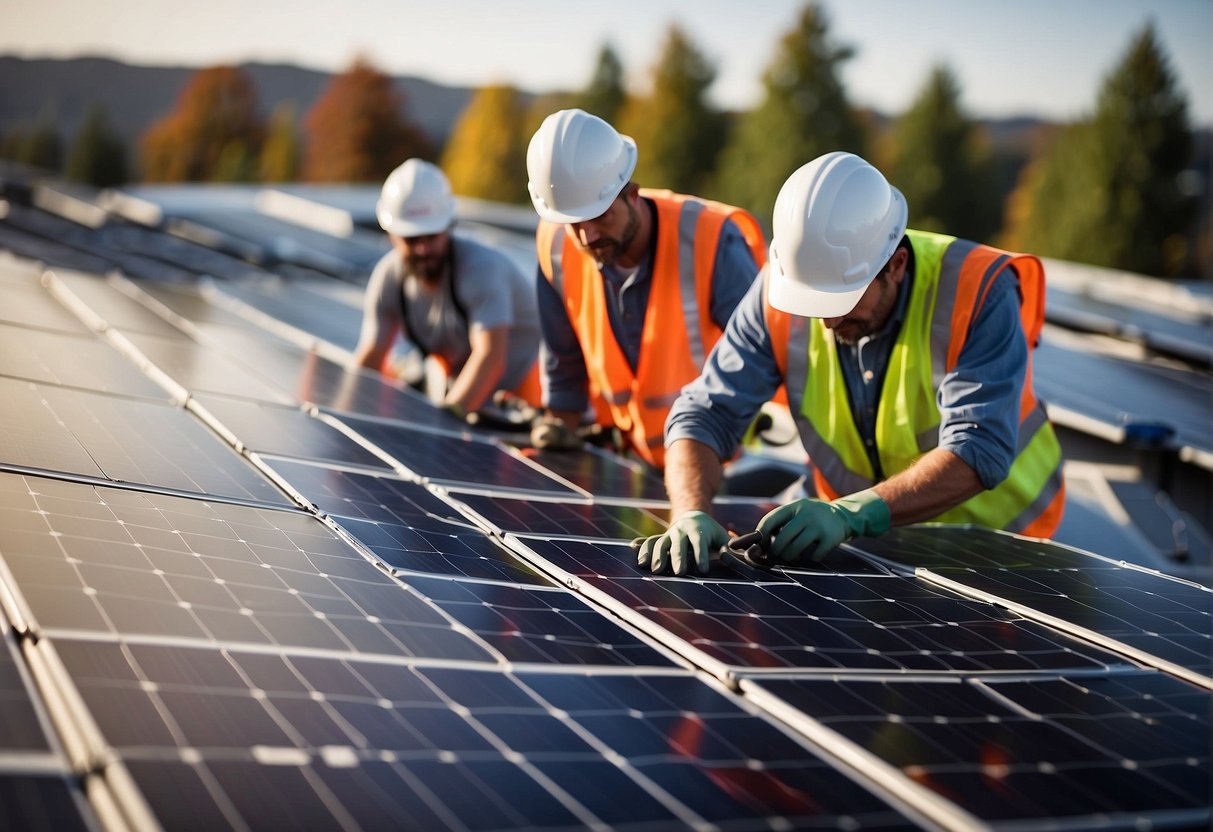Choosing the right solar installer is a crucial step in the transition to renewable energy for homeowners and businesses alike. As solar energy continues to grow in popularity due to its environmental benefits and cost savings on electricity bills, the market is seeing a surge in companies offering solar installation services.
It is important for potential solar panel users to locate reputable and experienced installers in their area to ensure a smooth and efficient installation process.
Searching for ‘solar installers near me’ yields a list of potential service providers, but careful evaluation is necessary. Customers need to consider factors like the company’s track record, the quality of the equipment offered, warranties, and the after-sales support.
In many regions, there are also financial incentives and rebates available for solar energy adoption, and knowledgeable installers can help navigate these offerings.
The transition to solar power is a significant commitment that requires a substantial investment, and it pays to be well-informed.
A reliable solar installer will not only deliver a high-quality installation but also provide guidance on the most suitable system type based on the customer’s energy requirements and roof space.
They can also give an accurate estimate of the potential energy savings and help with the necessary paperwork for any available incentives or grants.
Types of Solar Power Companies
When exploring solar power options, consumers will typically engage with three main types of businesses: manufacturers, installers, and financing companies. Each plays a distinct role in the process of transitioning to solar energy.
Manufacturers
Manufacturers design and produce solar panels and related equipment. They are responsible for research and development of new solar technologies, as well as the actual fabrication of solar cells and panels. Notable manufacturers include companies like SunPower and First Solar, which are known for producing high-efficiency solar panels.
Installers

Installers specialize in fitting solar panels onto residential or commercial properties. They handle the on-site assessment, design of the solar array, installation process, and maintenance services. Companies such as SolarCity and Sunrun offer comprehensive installation packages, often including warranties and customer support.
Financing Companies
Financing Companies provide solutions for navigating the cost of solar installations. They offer leasing options, loans, and power purchase agreements (PPAs) to make solar energy more accessible. Examples include Sunnova and Mosaic, which are known for their flexible financing plans.
Choosing the Best Solar Installer
When selecting the best solar installer, homeowners should prioritize certification and experience. Installers certified by the North American Board of Certified Energy Practitioners (NABCEP) demonstrate a standard of excellence and adherence to professional ethics.
Reputation in the industry also matters. One can check online reviews and ask for client testimonials to assess an installer’s reliability.
| Consideration | Why It Matters |
|---|---|
| Certification | Ensures quality and professionalism |
| Experience | Gauge competence in diverse scenarios |
| Reputation | Reflects customer satisfaction |
| Warranty offered | Guarantees long-term service support |
| Price | Should align with market rates |
Homeowners must also evaluate the warranty offered on both the products and labor. A comprehensive warranty serves as a projection of an installer’s quality.
Lastly, obtaining multiple quotes ensures competitive pricing. Homeowners should compare the details of various proposals, ensuring they understand what is included in each price.
Remember, the lowest price might not always mean the best value. One should look for a balance between cost and the points mentioned, ensuring their investment is well protected and serviced over the coming years.
Homeowner’s Guide to Going Solar

When a homeowner decides to install solar panels, they should first assess their electricity needs. They can look at past utility bills to estimate their energy consumption.
Initial Research:
The next step involves understanding the available types of solar panels and their efficiency rates. Monocrystalline panels, for instance, are highly efficient but also more costly. Homeowners should compare panel types:
| Type | Efficiency | Cost |
|---|---|---|
| Monocrystalline | High | Higher |
| Polycrystalline | Medium | Medium |
| Thin-Film | Lower | Lower |
Before deciding on a solar system, homeowners should assess their roof’s suitability, considering:
They would save more money if they evaluate the incentives or rebates offered by their state or local government. Some common incentives include:
Selecting a reputable solar installer is crucial. Homeowners should research local companies, check reviews, and verify licenses and insurance. They should also obtain multiple quotes and ensure clear warranties are provided. Choosing an installer with a high level of experience and a good reputation will increase the likelihood of long-term satisfaction and support.
Maintenance of solar panels is relatively minimal but important. Regular cleaning and inspection can help maintain efficiency. An annual inspection by a professional can help detect any issues early on.
Factors to Consider

When selecting solar installers, homeowners should assess several key factors to ensure they make an informed decision. Here are some vital considerations:
A table for quick reference:
| Consideration | Description |
|---|---|
| Experience and Expertise | Installers with a long, successful history are preferred. |
| Licenses and Certification | Verify installer’s professional credentials. |
| Reputation and Reviews | Look for consistently positive customer feedback. |
| Warranty and Service | Seek strong warranties on both products and installation. |
| Cost and Financing | Compare quotes and ask about financing options. |
| Equipment Quality | Opt for high-quality solar panels and inverters. |
| Local and State Incentives | Ensure the installer can help with available incentives. |






